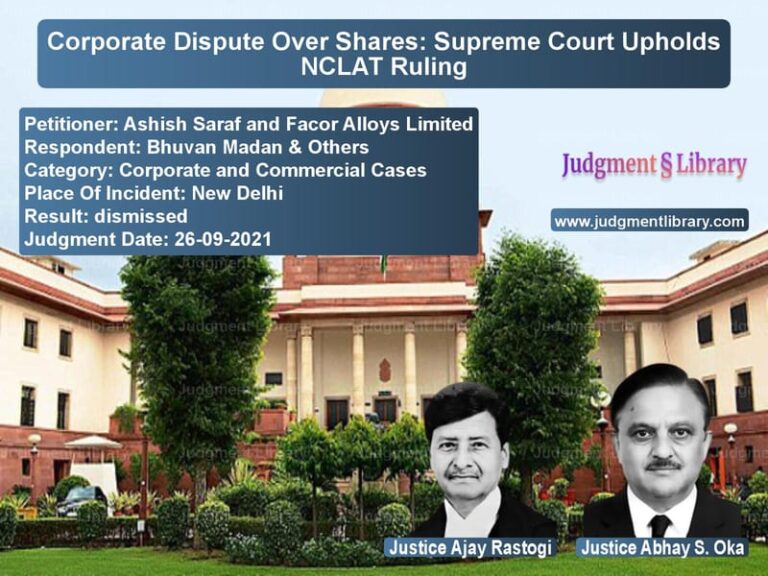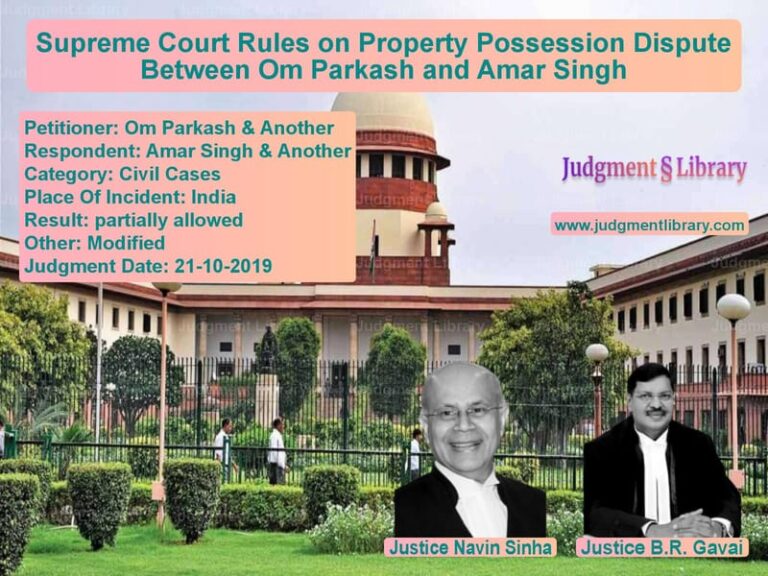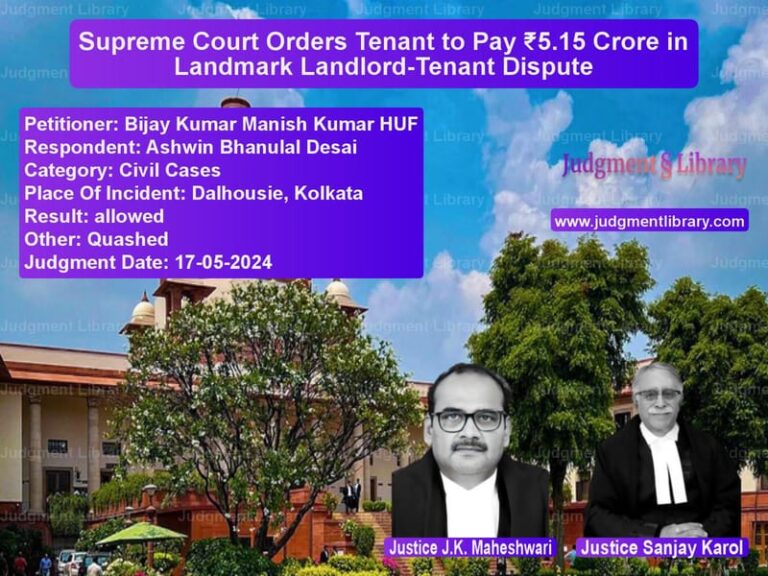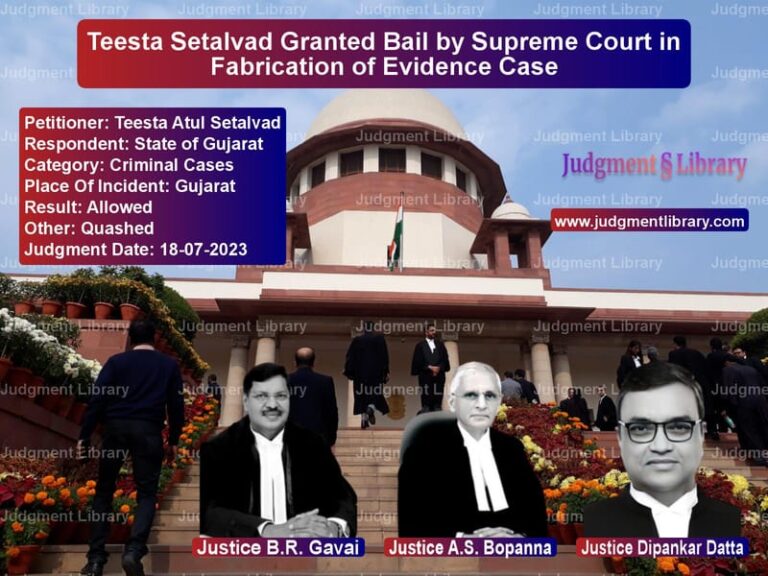Supreme Court Sets Aside Telangana High Court Order in Property Dispute
The Supreme Court of India delivered a significant judgment in the case of My Palace Mutually Aided Cooperative Society vs. B. Mahesh & Others on August 23, 2022. The dispute revolved around a long-standing property ownership battle concerning land in Shamsguda Village, Ranga Reddy District, Telangana. The Supreme Court overturned the Telangana High Court’s order that recalled a final decree passed in favor of the appellant, My Palace Mutually Aided Cooperative Society, and restored their ownership rights.
The judgment highlighted the misuse of Section 151 of the Code of Civil Procedure (CPC), which grants inherent powers to courts to prevent the abuse of process and ensure justice. The Court ruled that the High Court erred in exercising this power to recall a final decree that had been validly passed and remained unchallenged for years.
Background of the Case
The case has a long history, dating back to a property dispute involving the estate of Nawab Moinuddowla Bahadur. The dispute originally arose in 1953 when Smt. Sultana Jahan Begum, the daughter of the Nawab, filed a suit for the partition of her father’s estate, known as ‘Asman Jahi Paigah’. This suit was eventually transferred to the Andhra Pradesh High Court as C.S. No. 7 of 1958.
After multiple legal battles spanning decades, a preliminary decree was passed on April 6, 1959. The property in dispute, Survey No. 57 (Old Survey No. 274) in Shamsguda Village, was included in this decree.
Acquisition of Property by the Appellant
My Palace Mutually Aided Cooperative Society claimed ownership over the disputed land through:
- An Assignment Deed dated September 16, 2000, executed by the legal heirs of the original decree holders.
- A Conveyance Deed dated August 3, 2003, providing further transfer of rights.
- A Deed of Declaration/Confirmation dated August 12, 2011, which was registered to formalize their claim.
Based on these documents, the appellant filed an application (No. 837/2013) seeking a final decree confirming their ownership rights. The Andhra Pradesh High Court granted this final decree on September 19, 2013, declaring the appellant as the absolute owner of 92.56 acres of land.
Challenge by the State of Telangana and Respondents
After the formation of Telangana, the newly created state government challenged the final decree:
- The State filed an intra-court appeal (OSA SR No. 3744 of 2014) but delayed its filing by 913 days.
- The High Court dismissed the delay condonation application on December 22, 2020, thereby dismissing the state’s appeal.
- Following this, in 2020, private respondents filed multiple applications seeking to recall the final decree of 2013.
Arguments of the Appellant
The appellant, represented by Senior Counsel Dr. A.M. Singhvi and Mr. Dushyant Dave, presented the following key arguments:
- Delay and Laches: The recall application was filed seven years after the final decree was passed.
- No Right to Recall: The only available legal remedy for the respondents was to file a separate civil suit, not a recall application.
- Jurisdictional Overreach: The High Court had no power under Section 151 CPC to recall a valid decree.
- Fraud Claims Unsubstantiated: The respondents failed to provide any concrete proof of fraud.
- Judicial Bias Allegation: The senior judge of the High Court Bench had previously represented a party in a related dispute and should have recused himself.
Arguments of the Respondents
The respondents, represented by Senior Counsels Mr. C.S. Sundaram and Mr. V. Giri, countered with the following:
- Title Dispute: The original property dispute was unresolved, making the final decree flawed.
- Alleged Fraud: The appellant had failed to disclose crucial revenue court orders against them.
- Recourse to Section 151 CPC: The High Court had the inherent power to rectify injustice.
Supreme Court’s Observations and Judgment
The Supreme Court bench, comprising Chief Justice N.V. Ramana, Justice Krishna Murari, and Justice Hima Kohli, delivered the final verdict. The Court made the following key observations:
1. Misuse of Section 151 CPC
The Court clarified that Section 151 CPC is meant to fill procedural gaps and cannot be used to override statutory remedies:
“Inherent powers cannot be used to unsettle already decided issues. Once a final decree is passed, the only remedy is to challenge it through an appeal or a fresh suit, not a recall application.”
2. Delay and Laches
The Supreme Court ruled that the High Court should not have entertained the recall application filed seven years after the decree:
“The respondents had ample opportunity to challenge the decree earlier. Entertaining such a belated recall application sets a dangerous precedent.”
3. No Proof of Fraud
The Court found no substantive evidence proving that the appellant had obtained the decree fraudulently:
“Allegations of fraud must be backed by concrete proof. The respondents failed to establish any wrongdoing.”
4. Judicial Bias Concerns
The Supreme Court acknowledged that the senior High Court judge had earlier represented a party in related proceedings:
“While we do not doubt the integrity of the judge, judicial propriety demanded that he recuse himself.”
Final Judgment
The Supreme Court allowed the appeal and set aside the Telangana High Court’s order, stating:
“The recall of the final decree was unjustified. The High Court exceeded its jurisdiction under Section 151 CPC. The appeal is allowed, and the impugned judgment is quashed.”
Impact of the Judgment
The ruling has significant legal implications:
- Strengthens Finality of Decrees: Ensures that long-settled property rights are not disturbed arbitrarily.
- Limits Misuse of Section 151 CPC: Prevents its use as an alternative to statutory remedies.
- Ensures Timely Legal Action: Encourages litigants to challenge decrees within the prescribed time limits.
- Upholds Judicial Impartiality: Reinforces the importance of recusal in cases of potential bias.
Petitioner Name: My Palace Mutually Aided Cooperative Society.Respondent Name: B. Mahesh & Others.Judgment By: Justice N.V. Ramana, Justice Krishna Murari, Justice Hima Kohli.Place Of Incident: Shamsguda Village, Telangana.Judgment Date: 22-08-2022.
Don’t miss out on the full details! Download the complete judgment in PDF format below and gain valuable insights instantly!
Download Judgment: my-palace-mutually-a-vs-b.-mahesh-&-others-supreme-court-of-india-judgment-dated-22-08-2022.pdf
Directly Download Judgment: Directly download this Judgment
See all petitions in Property Disputes
See all petitions in Specific Performance
See all petitions in Landlord-Tenant Disputes
See all petitions in Judgment by N.V. Ramana
See all petitions in Judgment by Krishna Murari
See all petitions in Judgment by Hima Kohli
See all petitions in allowed
See all petitions in Quashed
See all petitions in supreme court of India judgments August 2022
See all petitions in 2022 judgments
See all posts in Civil Cases Category
See all allowed petitions in Civil Cases Category
See all Dismissed petitions in Civil Cases Category
See all partially allowed petitions in Civil Cases Category







